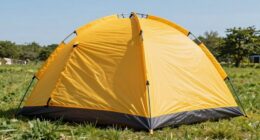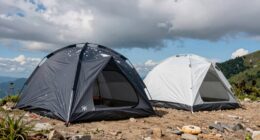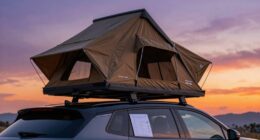Believe it or not, I recently found myself in a situation that many campers can relate to: my camper was invaded by mice. While some may underestimate the impact of these tiny creatures, they can quickly ruin a camping experience. That’s why I’m eager to share with you the proven methods I learned to effectively remove those pesky mice from your camper for good.
In this article, I will guide you through a step-by-step process of identifying signs of mice infestation, sealing entry points, removing attractants, setting traps, using natural repellents, cleaning and disinfecting, and properly storing your camper. By following these techniques, you can ensure a mouse-free camping experience and prevent any future unwanted guests from invading your cozy home on wheels.
So, let’s roll up our sleeves, grab some gloves, and get ready to reclaim your camper from those furry intruders. It’s time to put an end to the mouse invasion and enjoy the great outdoors without any unwanted surprises.
Key Takeaways
- Identify signs of mice infestation and take immediate action to prevent further damage.
- Seal all entry points on the camper to prevent mice from entering.
- Properly store food in airtight containers and maintain cleanliness to remove attractants.
- Consider seeking professional help from exterminators for severe or persistent infestations.
Identify Signs of Mice Infestation
You need to take a close look inside your camper and be prepared to feel a surge of disgust when you spot chewed-up food containers and droppings, clear signs that those pesky mice have invaded your space.
Prevention methods are crucial to keep these unwanted guests away from your camper. Mice can fit through very small openings, so it’s important to seal any entry points. Start by inspecting the exterior of your camper for gaps or holes. Pay close attention to areas where utility lines enter the camper, as these are common entry points for mice. Use steel wool or caulk to seal any openings you find.
Additionally, make sure all windows and doors have tight-fitting screens or weatherstripping to prevent mice from sneaking in. It’s also essential to keep food stored in airtight containers and clean up any crumbs or spills promptly. Mice can carry diseases and pose health risks to humans, so it’s important to take these preventive measures seriously.
By implementing these prevention methods, you can effectively keep mice out of your camper and enjoy a pest-free environment during your travels.
Seal Entry Points
To effectively prevent unwanted visitors, it’s essential to seal all possible entry points in your camper. Mice can squeeze through even the tiniest openings, so a thorough inspection is crucial. Here are some maintenance tips to help you prevent infestation:
-
Examine the exterior: Start by checking the camper’s exterior for any gaps or openings. Pay close attention to areas where utility lines or pipes enter the camper. Seal these openings using silicone caulk or expanding foam insulation.
-
Inspect windows and doors: Mice can enter through damaged or poorly sealed windows and doors. Replace any torn screens and make sure that all windows and doors close tightly. Add weatherstripping if necessary to create a tight seal.
-
Check vents and openings: Mice can also enter through vents and openings designed for air circulation. Install mesh screens over these openings to prevent mice from getting in.
By sealing all possible entry points, you can significantly reduce the chances of a mouse infestation in your camper. Once you’ve completed this step, it’s time to move on to the next section about removing attractants. This will further discourage mice from entering your camper.
Remove Attractants
Getting rid of any food sources and eliminating attractants is crucial in preventing mice from being drawn to your camper like a moth to a flame.
To prevent future infestations, it’s essential to implement preventive measures. Start by cleaning your camper thoroughly and removing all food crumbs and spills. Mice are attracted to the scent of food, so make sure to clean up any food residue in the kitchen area, dining table, and storage compartments. Store all food in airtight containers to deny the mice access to their favorite delicacies.
Additionally, remove any potential nesting materials such as paper, cardboard, or fabric that mice can use to build their nests. Seal off any openings that could serve as entry points for mice, including gaps around pipes, vents, and windows. Use steel wool or caulk to fill these gaps and ensure a tight seal.
By removing attractants and implementing preventive measures, you can greatly reduce the chances of mice infesting your camper.
With these preventive measures in place, it’s time to move on to the next step: setting traps to catch any remaining mice.
Set Traps
Now that the camper has been thoroughly cleaned and all attractants have been removed, it’s time to start setting traps to catch any remaining rodents. Setting traps is a crucial step in getting mice out of a camper. It’s important to choose the right type of trap and set it properly to ensure maximum effectiveness.
First, set bait in the traps to attract the mice. Peanut butter, cheese, or grains are commonly used as bait. Place a small amount of the bait on the trigger mechanism of the trap. Make sure to secure the bait so that it doesn’t easily fall off.
Next, strategically place the traps in areas where mouse activity has been observed, such as near entry points or along walls. It’s essential to check the traps regularly, at least once a day, to see if any mice have been caught. If a mouse is caught, dispose of it properly and reset the trap.
Now that the traps are set and baited, it’s time to move on to the next step: using natural repellents. These repellents can help deter mice from entering the camper in the first place, reducing the need for traps.
Use Natural Repellents
Try using natural repellents to keep those pesky critters away from your camper! Here are three DIY solutions that can effectively deter mice from entering your camper:
-
Peppermint oil: Mice dislike the strong scent of peppermint oil, making it an excellent natural repellent. Soak cotton balls in peppermint oil and place them strategically around your camper, focusing on areas where mice are likely to enter. The strong aroma will deter them from getting near your camper.
-
Mothballs: Mothballs contain naphthalene, a chemical that repels mice. Place mothballs in small fabric bags and hang them in various areas of your camper. Ensure that they are placed out of reach of children and pets, as they can be toxic if ingested.
-
Steel wool: Mice can easily squeeze through small openings in your camper. To prevent their entry, fill any cracks, crevices, or holes with steel wool. Mice can’t chew through this material, making it an effective barrier.
Using natural repellents is a safe and environmentally friendly way to keep mice away from your camper. However, if you find that these DIY solutions aren’t effective, it may be time to consider calling a professional exterminator for further assistance in dealing with the mouse infestation.
Call a Professional Exterminator
If the infestation persists or is severe, I highly recommend seeking professional help. Exterminators have specialized knowledge and equipment that allows them to effectively eliminate mice from your camper. Their expertise in dealing with infestations ensures that the problem will be addressed thoroughly and efficiently.
If the infestation persists or is severe, seek professional help
When the infestation of mice in your camper becomes severe and seems impossible to handle on your own, it’s time to reach out to a professional for help, leaving you with a glimmer of hope in this unsettling situation. Seeking professional assistance in dealing with a severe infestation has its advantages. Here are four reasons why it’s crucial to seek the expertise of a professional:
-
Expertise: Professional exterminators have specialized knowledge on mouse behavior, infestation patterns, and effective eradication methods.
-
Safety: They employ techniques and products that are safe for both humans and pets, ensuring the well-being of everyone involved.
-
Efficiency: Professionals have access to specialized equipment and tools that can efficiently eliminate mice from your camper.
-
Prevention: They can provide guidance on preventive measures to avoid future infestations, such as sealing entry points and maintaining cleanliness.
By involving a professional exterminator, you can benefit from their specialized knowledge and equipment, leading to a more effective resolution of the issue.
Exterminators have specialized knowledge and equipment
Hiring a professional exterminator for your camper infestation can bring a sense of relief as their specialized knowledge and equipment swiftly tackle the problem. Exterminator services offer a range of pest control techniques to effectively eliminate mice from your camper. These experts understand the behavior and habits of mice, allowing them to strategically place traps and use targeted baits. Additionally, they possess the necessary equipment, such as infrared cameras and motion sensors, to identify and track the movement of mice within your camper. With their expertise, they can quickly assess the severity of the infestation and implement the most appropriate measures to eradicate the problem. By entrusting your camper to the hands of professionals, you ensure a thorough and efficient removal of mice.
They can effectively eliminate mice from your camper
To effectively eliminate mice from your camper, you’ll be amazed at how swiftly exterminators can tackle the problem with their specialized knowledge and equipment. Here are some reasons why exterminators are so effective in getting rid of mice:
-
They have access to professional-grade traps and baits that are highly effective in capturing and eliminating mice.
-
Exterminators are trained to identify the entry points that mice use to enter your camper, allowing them to seal off these areas and prevent future infestations.
-
They can provide valuable advice on preventive measures, such as storing food properly and keeping your camper clean and clutter-free.
-
Exterminators also know about natural deterrents that can help repel mice, such as peppermint oil or ultrasonic devices.
With the expertise of exterminators, you can ensure a mouse-free camper. Once the infestation is dealt with, it’s important to clean and disinfect the camper to remove any traces of mice and prevent the spread of diseases.
Clean and Disinfect
To effectively address the issue of mice in my camper, it’s crucial to thoroughly clean all surfaces and storage areas. This will not only remove any visible signs of mice, such as nesting materials and droppings, but also help eliminate any lingering odors that may attract them back.
Using a disinfectant is essential in this process to ensure that all potential sources of contamination are eliminated, creating a clean and safe environment for future use.
Thoroughly clean all surfaces and storage areas
First, start by wiping down all surfaces and storage areas in your camper, making sure to get into every nook and cranny where those pesky mice may have left their mark. Use appropriate cleaning methods such as vacuuming, scrubbing, and dusting to ensure a thorough clean.
Remember, prevention is key in keeping mice away, so take note of these tips:nn1) Seal any openings or cracks where mice can enter.nn2) Store food in airtight containers to avoid attracting them.nn3) Keep your camper clean and clutter-free to eliminate hiding places.
By following these cleaning methods and prevention tips, you can significantly reduce the likelihood of mice returning to your camper.
Once you’ve completed the cleaning process, use a disinfectant to eliminate any lingering odors and transition into the subsequent section.
Use a disinfectant to eliminate any lingering odors
Now that you’ve thoroughly cleaned your camper, it’s time to tackle those lingering odors by using a disinfectant that will leave your space smelling fresh and clean. When choosing a disinfectant, it is important to consider its effectiveness in eliminating odors and killing bacteria. Look for products specifically designed to target odors and ensure they are suitable for use on the surfaces in your camper. To assist you in selecting the right disinfectant, consider the following table:
| Disinfectant | Effectiveness in Eliminating Odors | Suitable for Camper Surfaces |
|---|---|---|
| Product A | High | Yes |
| Product B | Medium | Yes |
| Product C | Low | No |
If you prefer natural repellent alternatives, you can try using ingredients such as vinegar or baking soda, which are known for their odor-absorbing properties. These alternatives may not be as effective as commercial disinfectants, but they provide a more eco-friendly option. After eliminating the odors, it’s crucial to move on to the next step and remove any nesting materials or droppings left behind by the mice. This will help prevent further infestation and maintain a clean and sanitary environment in your camper.
Remove any nesting materials or droppings
Once you’ve tackled those lingering odors, it’s time to roll up your sleeves and start removing any nesting materials or droppings left behind. This step is crucial to ensure that your camper is free from any potential health hazards and to prevent further infestations.
Begin by wearing gloves and a face mask to protect yourself from any potential diseases carried by the mice. Use a vacuum cleaner with a HEPA filter to thoroughly clean all areas where you suspect mice have been nesting, including hidden corners, cabinets, and storage compartments. Pay close attention to areas with signs of droppings or chewed materials.
After vacuuming, disinfect these areas using a cleaning solution that contains bleach or hydrogen peroxide. This will help eliminate any remaining bacteria or viruses.
Finally, dispose of all nesting materials and droppings in a sealed bag and properly sanitize your vacuum cleaner.
By following these cleaning techniques and preventive measures, you can ensure a mouse-free and hygienic camper.
As we move on to the next section about storing your camper properly, remember that taking these steps will help prevent future infestations.
Store Your Camper Properly
To prevent your camper from becoming a cozy haven for mice, make sure you store it properly. Proper storage is essential in preventing infestations and keeping these pesky rodents at bay. Here are three key tips to ensure your camper is stored correctly:
-
Clean and declutter: Before storing your camper, thoroughly clean it to remove any food crumbs or spills that may attract mice. Additionally, decluttering the interior will eliminate potential hiding spots for these unwanted guests.
-
Seal all entry points: Mice can squeeze through tiny openings, so it’s crucial to seal any gaps or cracks in your camper. Inspect the exterior for holes in the walls, vents, or windows, and use rodent-proof materials like steel wool or caulk to seal them off.
-
Elevate and cover: Store your camper off the ground to make it less accessible to mice. Placing it on concrete blocks or using a dedicated camper storage platform can help deter these pests. Additionally, cover the camper with a breathable, fitted tarp to protect it from the elements and further discourage mice from entering.
By following these proper storage techniques, you can greatly reduce the likelihood of a mouse infestation in your camper. However, it’s important to stay vigilant in maintaining these measures to ensure long-term prevention.
Stay Vigilant
Make sure you keep an eye out and stay vigilant to ensure your camper remains free from unwanted guests. Preventive measures are crucial in keeping mice out of your camper for the long term.
Mice are notorious for finding their way into small spaces, so it’s important to inspect your camper regularly for any signs of infestation. Look for droppings, chew marks, or gnawed wiring, as these are all indications that mice may be present.
Seal any openings or gaps in your camper with steel wool or caulk to prevent mice from entering. Additionally, store all food and trash in airtight containers to eliminate potential attractants.
To further deter mice, consider using mouse repellents such as peppermint oil or mothballs. These can be placed strategically around your camper to create an unappealing environment for mice.
Regular cleaning and decluttering of your camper will also help eliminate hiding spots for mice. By following these preventive measures and staying vigilant, you can enjoy a mouse-free camping experience!
Enjoy a Mouse-Free Camping Experience!
Ensure you have a stress-free camping experience by keeping your camper free from unwanted rodents. Here are three effective ways to prevent mice from entering your camper:
-
Seal all entry points: Mice can squeeze through tiny openings, so it’s crucial to inspect your camper thoroughly and seal any gaps or cracks. Use weatherstripping, caulk, or metal mesh to cover holes in walls, floors, and windows. Don’t forget to check for openings around pipes and vents.
-
Eliminate food sources: Mice are attracted to food, so keeping your camper clean and food-free is essential. Store all food in airtight containers and avoid leaving any crumbs or spills behind. Regularly clean your camper, including the kitchen area, to remove any food residues that could entice mice.
-
Use natural deterrents: There are several natural repellents that can discourage mice from entering your camper. Peppermint oil, for example, has a strong scent that repels rodents. Soak cotton balls in peppermint oil and place them in areas where mice might enter. You can also try using dryer sheets, as the strong fragrance can be effective in deterring mice.
By following these mouse prevention methods and incorporating natural deterrents, you can enjoy a mouse-free camping experience. Remember to stay vigilant and regularly inspect your camper for any signs of rodent activity.
Frequently Asked Questions
How do I know if there are mice in my camper?
To identify mice infestation in campers, there are several signs to look out for. One interesting statistic is that a single mouse can produce up to 50 droppings per day. So, if you notice small, pellet-shaped droppings in your camper, it could be a sign of a mouse problem.
Other signs include chewed wires or insulation, gnaw marks on food containers, and a strong musty odor. These indicators should prompt you to take action and address the issue promptly.
What are some common entry points for mice in campers?
Common entry points for mice in campers include gaps or cracks in the exterior walls, openings around pipes or wires, and poorly sealed windows or doors. These are typically the areas where mice can easily squeeze through.
To identify these entry points, look for common signs such as droppings, chewed materials, or gnaw marks. Once identified, you can effectively trap the mice using baited snap traps or live traps to safely remove them from your camper.
How can I prevent mice from being attracted to my camper?
How can I prevent mice from being attracted to my camper?
To prevent mice infestation, the best methods for mice control are to eliminate potential food sources and seal off possible entry points. Are your food storage containers airtight and elevated?
Have you inspected the camper for cracks or openings?
By taking these preventative measures, you can greatly reduce the chances of mice being attracted to your camper and avoid the hassle of dealing with an infestation.
Are there any natural repellents that can effectively keep mice away?
Yes, there are natural repellents that can effectively keep mice away. Some DIY solutions include using peppermint oil, cloves, or vinegar as a deterrent. These natural repellents have strong smells that mice find unpleasant and will avoid. Simply soak cotton balls in the chosen repellent and place them strategically around the camper, focusing on areas where mice are likely to enter. Reapply the repellent every few weeks for optimal results.
When should I consider calling a professional exterminator for a mice problem in my camper?
When dealing with a mice problem in my camper, I consider calling a professional exterminator if the DIY solutions fail to yield results.
While attempting to tackle the issue myself is a cost-effective approach, there are instances when a professional’s expertise is necessary.
Factors such as the severity of the infestation, the potential for damage, and the importance of a swift resolution play a role in determining when professional assistance is warranted.
Conclusion
After following these steps, you can successfully get rid of mice in your camper.
By identifying signs of infestation, sealing entry points, and removing attractants, you can prevent future mouse problems.
Setting traps and using natural repellents will help eliminate the existing mice.
Additionally, cleaning and disinfecting your camper, along with proper storage, will keep mice away.
Stay vigilant and take necessary precautions to ensure a mouse-free camping experience. Now you can enjoy your trips without worrying about unwanted guests!










